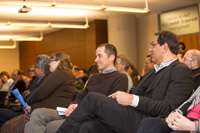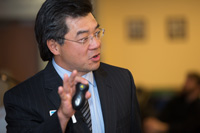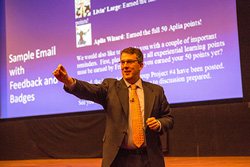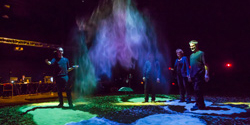e.SCAPE inspires and informs

During his plenary remarks at Concordia’s recent conference titled e.SCAPE: Knowledge, Teaching, Technology, President Alan Shepard offered a counterweight to the “apocalyptic visions” popular in discussions about online learning and its forecasted effects on higher education.
As long as it’s approached with caution and nuance, he argued, online learning represents a positive force in education. “I think we have an enormous amount still to learn about the online revolution, tsunami, whatever it may be,” he said, “And what I hope for the Concordia community is that we will embrace this stuff without being slavish about it.”
He said current experiments with new learning technologies represent a pent-up hunger for change among educators, and that Concordia needs to remain at the forefront.

“I think it will be fun and interesting for Concordia to be a primary investigator in that process; not to be sitting at the back of the bus while somebody else drives us along, but to be actually engaged in it ourselves,” Shepard said.
The e.SCAPE conference was an opportunity for faculty, students and staff to join the ongoing global discussion about technology-integrated teaching. The three-day event featured dozens of presentations, workshops, and demonstrations on everything from designing and developing an online course, to using social media and games to enhance the learning experience.

Two invited keynote speakers — Professor Kenneth G. Brown from the University of Iowa Tippie College of Business, and Atsusi Harumi from the University of Central Florida — also brought their expertise in teaching with technology to the conference.
During his address, Brown insisted that, regardless of what pedagogical purpose a certain technology is used for, it should always be judged according to its value in helping students learn.
“In some cases technology gets in the way,” he said. “We must learn when it does, and when it doesn’t, so we know when to stop (using it) and kick it out of the classroom, and when to adopt it, modify it, and make it central to what we do.”

Associate Professor and 3M Teaching Fellow Arshad Ahmad moderated a panel discussion titled Online, Hybrid and F2F: The Future of Learning. The panellists addressed the democratizing force of technology, the benefits and challenges of flipped classrooms and hybrid courses, and the promise and perceived threat of MOOCs, or massive open online courses.
They underlined the importance of having a global perspective and using caution when implementing technology in teaching, but like Shepard, they also expressed excitement about the changing educational landscape.
“There are a lot of lessons to be learned from the past, but that said, we shouldn’t let our caution prevent us from experimenting in learning,” said panellist Saul Carliner, Concordia’s E-Learning Fellow. “Otherwise, we’ll be denying people the opportunity to learn more effectively, and that’s really what this challenge is all about.”

Carliner, one of the main architects of e.SCAPE, delivered two other presentations during the conference; one on adjusting teaching practices from the classroom to online, and another detailing the current research findings regarding online learning’s effectiveness.
By the end of the three-day event, Carliner’s voice was almost gone, but he mustered a few words to express his satisfaction with how the conference had unfolded.
“I thought it was great,” he said. “It was really nice to see so many people from the Concordia community, but also from the broader community taking part.
“The conversations here were not just looking at all-online courses. They were looking at the full spectrum, the full continuum of integrating technology into teaching,” he added. “That’s one great thing about this event — we’ve been able to get people to start thinking along the continuum, instead of just at the poles.”
Watch a slideshow of images from the conference:
Related links:
• e.SCAPE conference
• "Opinion: Technology in Higher Education: Threat or Opportunity?” — April 4, 2013
• "Exploring technology in teaching" — NOW, March 26, 2013
• “Black Box magic @ e.SCAPE” — NOW, March 19, 2013
• “Our leaders in e-learning” — NOW, March 13, 2013
• “e.SCAPE conference: innovation central” — NOW, March 4, 2013
• “Meet top brains @ e.SCAPE conference” — NOW, February 27, 2013
• “E-learning: New pathways in education” — NOW, February 20, 2013